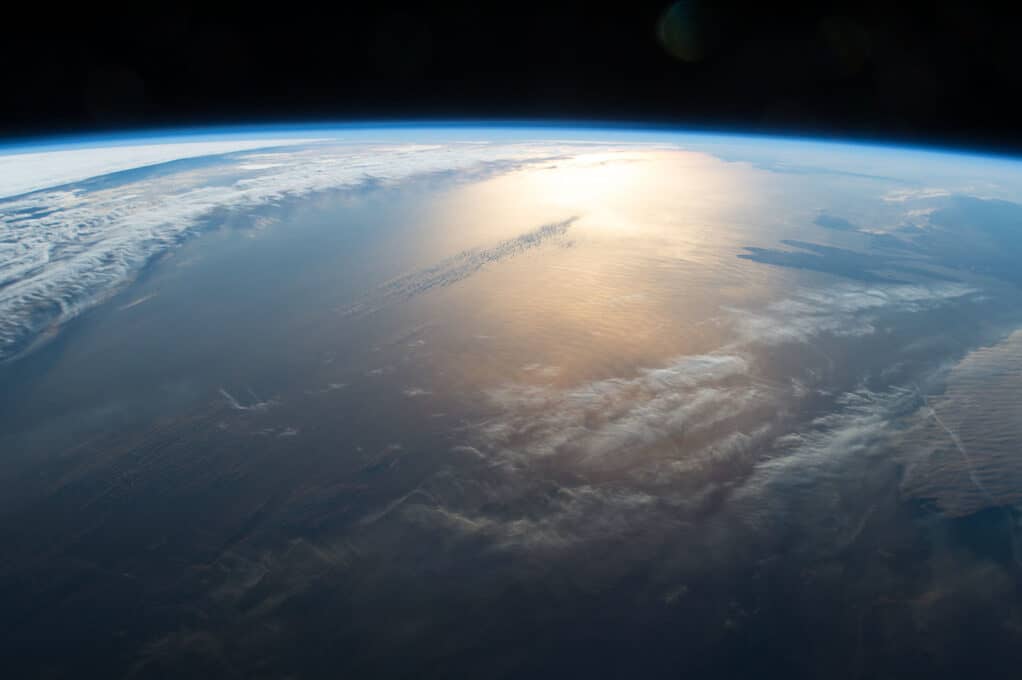If you missed it, don’t fret. From up here, the raised thumb of the Yucatan Peninsula passes beneath me sixteen times a day. Whenever possible, I finger-trace the submerged impact depression of the Chicxulub Crater through a portal. Stroke the big rock that ended the Cretaceous Era. When you can touch something that’s never been touched, it should be the final act of your life.
Twenty years ago, as the tour guide prattled on about diving-depth limits, this was on my mind. See, I hadn’t flown a thousand miles to Chicxulub to hunt for pearls. Nor did I end up here last week just to drop a few steel sepulchers into geosynchronous orbit. But to straddle time, one needs staging.
***
Human physiological limit with scuba gear is around two hundred feet.
A five-millimeter layer of Neoprene, a quarter-inch of tank steel, and assorted plies of rubber and plastic keep you kicking. Beyond that, without specific air mixtures and a slow, careful ascent, you’re feeding tube worms.
Up here in the derelict International Space Station, it’s no different. A few centimeters of Kevlar-reinforced insulation swathing mere millimeters of aluminum. That’s it. All that stands between me and the vacuum.
Between me and Perses, the other big rock on the way.
***
How I got here is, after the navy, I fell into designing high-end safes for wealthy VIPs. I innovated a self-locking spherical model composed of titanium, got wealthy, then got bored.
After Perses appeared, so did motivation. One day I cladded a sphere with a layer of tantalum to shield against ionizing radiation, and the prototype for the remembrance sphere was born.
When I got offered a small fortune to crank out a batch in short order, I deferred it. I had no idea how to monetize a thing that I saw as achievable by any number of obsessives.
***
The Chicxulub asteroid I yearned to feel has no name other than for the region it hit. When 2033-ND13 was discovered eighteen months ago, it was designated Perses, after the Greek titan of destruction. An amateur star-gazer in Idaho with a backyard telescope spotted a twelve-kilometer-wide rock that none of our underfunded agencies could find with their vastly larger arrays.
Once the number crunching verified the worst-case scenario, it was decided that cultural posterity should reside separately from where the only viable shelters were being covertly built under the Patagonian Andes.
The funding source for this remains vague, diffuse, and unhampered by red tape.
***
It’s been said that an opened remembrance sphere evokes a split locket, but they always remind me of the oysters I swam past as I plunged deeper beneath the Gulf of Mexico, unspooling rope into a rapidly fading light.
***
Water fills three-quarters of the world, ninety-nine percent of which is inaccessible without some manner of technology. The thinnest of sheets keep us alive. If the Earth were a remembrance sphere, its atmosphere would be the thickness of cellophane. All our bare flesh can hope to touch of the universe is a hair’s breadth. This has been my quandary.
***
Five days after my dive, when I awoke from the coma, they said I’d nearly reached three hundred feet before the boat hauled me back up. Even unconscious, they said I was smiling. The rapid decompression had caused all my joints and muscles to seize. The inverted half-domes stippling my body are the result of uneven pressure dispersal. Pitted edema, it’s called. But to touch what’s never been touched often yields scars.
It took two men to pry the mud and rocks from my hands.
***
The thing to remember about maximizing your survival time in the vacuum of space is to not hold your breath. Unlike the compression from the bends, the gases in your lungs and digestive tract will expand rapidly from the sudden pressure loss, and while you’ll bloat some, you won’t explode like in the movies. Amazingly enough, your paper-thin layer of skin is enough to keep you whole.
***
Two hundred and fifty. That’s how many remembrance spheres were ultimately commissioned, each to contain the works deemed by the selected lot of philosophers, artists, and statesmen as the epitome of humanity.
Personal mementos such as photos and journals were deemed optional, a most dangerous word, fraught with permissibility.
Once I completed the spheres, the issue of deployment jumped to the forefront. With dwindling time and resources, mankind’s executor would likely be facing a one-way mission. A volunteer was needed.
I’d found my fee.
***
So you won’t explode in space, but what will happen initially is the moisture in your eyes and mouth will boil away. Wait about a minute, and you’ll start convulsing as hypoxia kicks in. Wait two minutes—the maximum survival threshold—and your blood will start to boil. Then your heart stops. But two minutes is enough. When I was pulled from the water, I had two minutes of air left, and I managed to graze singularity.
***
A week to kill and surrounded with this much knowledge and secrecy?
Yeah, I’d sworn an oath. Resisted permissibility. But to fail to touch accessible greatness? Too much incongruity to defy.
Oh, I’ll fill them back up and deploy them as promised. All these broken, hinged orbs careening softly in three of the ISS modules sadden me too much to leave as is. Oysters gutted of their pearls. Yeah, the items may not match the makers, but if in a millennium they’re retrieved and opened, the numbers will add up to the same graceful uncertainty.
***
To graze singularity again, I’ll have to position the ISS perfectly. Only then will I open the airlock and, forgoing all tethers, fly unencumbered straight towards Perses. I should just catch its wake before it unzips the cirrocumulus blanketing the Iberian Peninsula. Then, if my eyes are still working, I’ll watch the east coast of Canada rise in an impossibly bright inverted cone that breaches the caul of the atmosphere, and all that was scooped from me will be replenished.
–
When not scribbling twisted musings into spiral notebooks, photographing the odd puddle or junk pile, or building old furniture, Dino Parenti earns a little scratch drawing buildings.
Lead image: “ISS049e028944 (10/05/2016)” (via Flickr user NASA Johnson)


Always a fan of Dino’s work. Wild stuff.
[…] following story was originally published in Cease, Cows in December of 2013. Click here to see the original […]
Reblogged this on menteimparable and commented:
Cósmico
Thank you all for your kind replies. I truly appreciate that you took the time to read it–it means a lot.
Well , its good
Great job. Very unique and creative.
Wow. That is all I can say after reading that. It’s incedible to feel ‘pulled in’ like this with so few words…
Great writing. Real calibre!
Loved it. Check out some of my short stories too and sincerelyjenna.wordpress.com and tell me what you think!
Reblogged this on think (feel) be and commented:
Some of the phrases in this piece are just right…
And the understatement throughout–beautiful.
Nice post and blog.
If there is any chance you like films from around the world from any period please check out my blog. https://aworldoffilm.com/
nice
Reblogged this on rekikiker.
Nice one.
nice
Reblogged this on Wright-Wang Extreme Mystery, Inc..
Congratulations on being featured on Freshly Pressed! 😀
Unique.
And I second that. Excellent!
Nicely written, reminds me of a Frederik Pohl story, with the imagery and the slight vagueness.